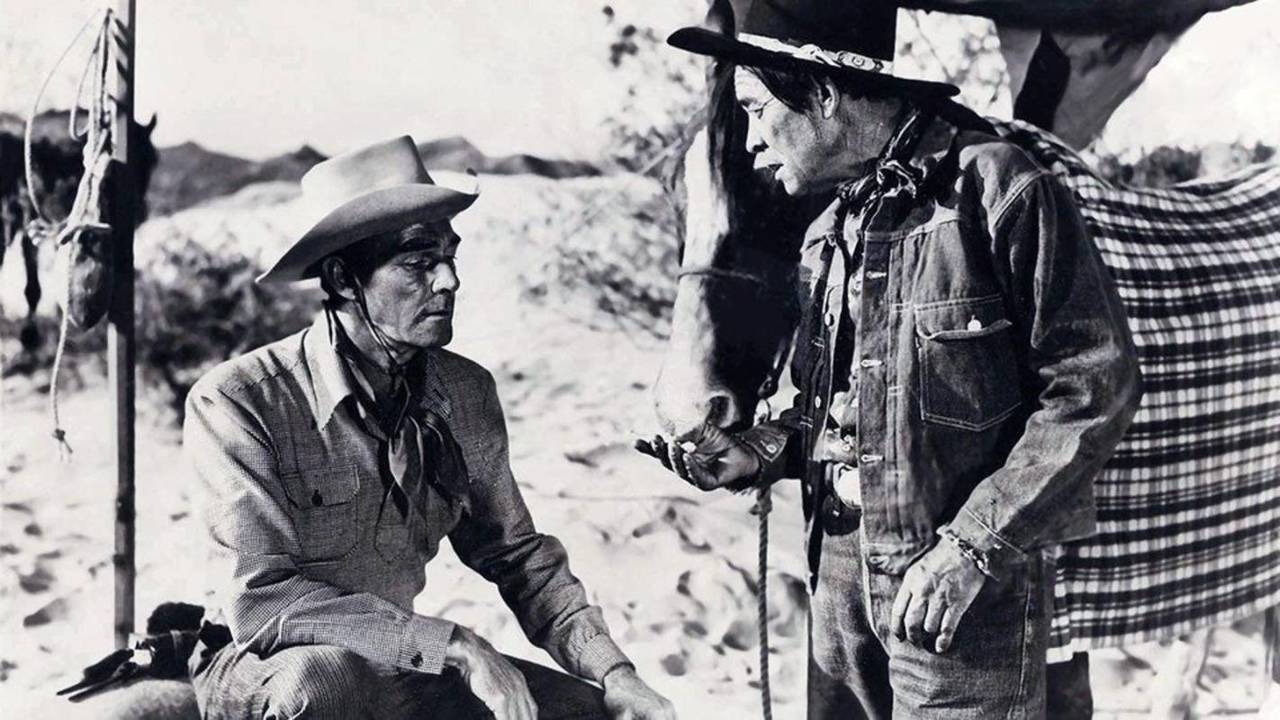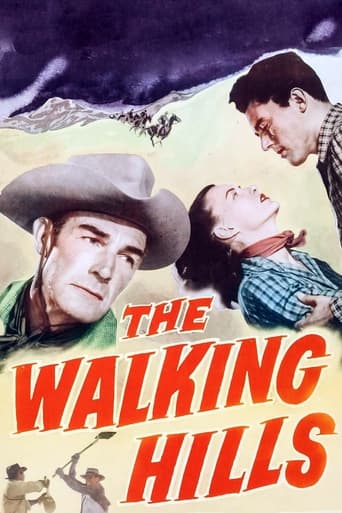Diagonaldi
Very well executed
PodBill
Just what I expected
Brightlyme
i know i wasted 90 mins of my life.
Keira Brennan
The movie is made so realistic it has a lot of that WoW feeling at the right moments and never tooo over the top. the suspense is done so well and the emotion is felt. Very well put together with the music and all.
wayjl-91327
Anything with Ella Raines is always worth watching. Totally captivating, beautiful and so talented. The ideal American girl. When you die, if you wake up in Heaven, Ella will be who you will see first. She just blows away all the other actresses of her generation, not to mention present day. I think she smokes in every picture she made. No wonder throat cancer got her in the end.
dbdumonteil
Excellent western ,where what is apparently the main subject (the search for gold) is actually of secondary importance in the end.The director is much more interested in his characters and the relationships that are formed between them.He superbly films the desert ,which has got something lunar ,disturbing ;the signals in the distance increases this feeling of mystery.Even the flashbacks are strange ,they seem completely out of place (Ella Raines could have told her story ) and they add to the threatening atmosphere.Most of the time,the viewer does not know who is searching who and almost all the action takes place in the same place (apart from the beginning) ,which is very rare in a western.Impressive sand-storm scene.
clore_2
A very rewarding "lust for gold" adventure that tells its story in a brief 78 minutes and is all the better for it. Director John Sturges would later in his career allow some of his films to run overlong (THE GREAT ESCAPE) or blow up what should have been more simply told (GUNFIGHT AT THE OK CORRAL - the depicted gunfight itself is but one example), but earlier in his career made a number of lean, taut treasures, this is one of them.A group of people are bound together in the search for some wagons believed to have been lost in the desert a century earlier, and the legend has it that gold was on them. When the youngest of them happens to mention something spotted in the desert, the need for secrecy binds the group together lest someone reveal the "golden opportunity." Several in the group have pasts that they are trying to hide and potential futures they are trying to escape if caught. One of them is a detective hot on a fugitive's trail, but willing to set aside duty for his share of the loot. Randolph Scott headlines as the more or less moral center of the group, even if his intentions and actions seem to defy that description. For a slightly less than "A" feature, the film boasts an admirable cast of characters, among them Ella Raines, John Ireland, Arthur Kennedy, Edgar Buchanan (scene stealing as usual) and blues/folk revivalist singer Josh White whose musical contributions to the film capture a legendary performer for posterity on film. William Bishop, a young man whom Columbia was grooming for stardom (but who failed to click and would soon "descend" to mostly TV work) is the least familiar perhaps of the major actors, but he's impressive enough here for one to wish he had done better within the ten years that he had left before cancer took him at 41.An interesting subplot has Scott's mare about to foal - a metaphor for new life or spiritual rebirth being created among the desert ruins. It gives nothing away to reveal that the fugitive surrenders or that some characters realize that gold fever can cause one to suspend principles - the latter is expected in such melodramas. But with its stunning black-and-white cinematography, especially in night scenes and the climatic desert storm, this film is as much of a treasure as that which its protagonists seek. Camera ace Charles Lawton must have impressed Scott and producer Harry Joe Brown as he would do five more films with the pair in the next decade. Highly recommended.
krorie
In 1948 the blockbuster movie John Huston's "The Treasure of the Sierra Madre" hit the big screen. This cinematic masterpiece took the entertainment world by storm and spawned several copies and variations including this early John Sturges flick. The same year 1949 saw a much better version on the same theme "Lust for Gold" starring Ida Lupino, Glenn Ford, and Gig Young, though neither reached the lofty peaks of Huston's classic. Coincidentally stalwart character actor Edgar Buchanan was in both films. Though "Lust for Gold" is better, "The Walking Hills" has its own merits. This thirst for hidden treasure is a recurring theme throughout mankind's existence on earth going all the way back to Soloman and before. During the post-World War II period when this film was released there was even a mad rush to find uranium because of the arms race involving the Cold War and the specter of the atomic bomb. Geiger counters became the rage. Hollywood hoped to cash in on this craze.One facet of "The Walking Hills" that caught my attention was the role played by Randolph Scott(Would you believe Jim Carey?). Apparently a fairly well-to-do horse breeder who talks about the races, his energy and time centers more on his mare who is about to foal than on the gold or the attractive Chris Jackson, played with sexual magnetism by the lady with the hypnotic eyes Ella Raines. He comes across as somewhat selfish and even pushy when he assumes leadership of the group of fortune seekers who did not ask his assistance. Only Frazee (John Ireland), the apparent private dick, attempts to stand up to him to no avail. Naturally, his reason is as selfish as Carey's. Actually, this is one of the most complicated roles Scott ever played and he shines as the brilliant actor that he was.Of the gold seekers, Arthur Kennedy is virtually wasted in a nondescript part. A face you seldom see on the big screen Jerome Courtland does a fine job in his part which is also somewhat mysterious. Willaim Bishop who tragically made too few films before his untimely death from cancer does well as the fugitive member of the gold seekers (Is he the only fugitive present?). Wily Edgar Buchanan as Old Willy talked the well-worn philosophy that he did so well. It's good to see the pop blues singer Josh White in a rare film appearance. One wonders why he didn't make more movies. His acting is almost as good as his singing and guitar playing. This is one of the few westerns (maybe the only one) that features the blues rather than country and western or Hollywood music. White was never quite the legend that Leadbelly was but some of his music was influential on the later folk revival in America.The script by Alan LeMay who wrote the novel from which "The Searchers" was adapted, leaves a lot to the viewer's imagination. There is much that is hidden and esoteric. Some of it is revealed by director Sturges in flashbacks but much goes unanswered. This is a ploy used by Hitchcock in many of his films. Hitchcock believed that certain parts of a story should be left to the imagination. Apparently LeMay felt the same way.There is much talk and conflict among the seekers that eventually leads to death for some of them. Nature intervenes in the form of a sandstorm, the highlight of this movie and not to be missed. Sturges shines as a director throughout with his innovative use of the camera, but the sandstorm is a treat to behold. The storm is also metaphorical. It washes away much and reveals much about human nature and the souls of the seekers. The Death Valley locale is appropriate for both story and character development.The title "The Walking Hills" refers to the shifting sands that form dunes that seem to walk like humans. The sand dunes may also hide items mankind values and then suddenly make them reappear.

